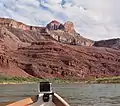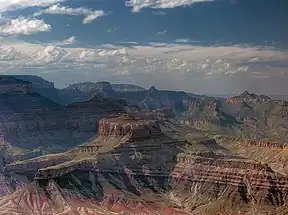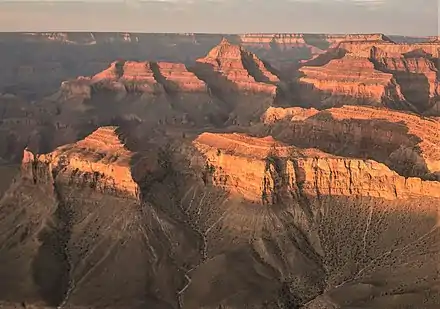Apollo Temple
Apollo Temple is a 6,252-foot-elevation (1,906-meter) summit located in the Grand Canyon, in Coconino County of northern Arizona, US.[2] It is situated four miles due east of Cape Royal on the canyon's North Rim, four miles northeast of Vishnu Temple, and a half-mile south-southeast of Venus Temple, which is the nearest higher neighbor. Topographic relief is significant as it rises over 3,600 feet (1,100 meters) above the Colorado River in less than two miles.
| Apollo Temple | |
|---|---|
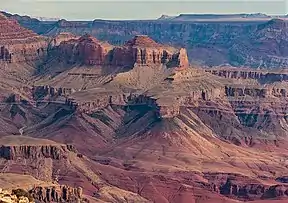 South aspect, from Moran Point | |
| Highest point | |
| Elevation | 6,252 ft (1,906 m)[1] |
| Prominence | 432 ft (132 m)[1] |
| Parent peak | Venus Temple (6,281 ft)[1] |
| Isolation | 0.59 mi (0.95 km)[1] |
| Coordinates | 36°06′56″N 111°52′48″W[2] |
| Geography | |
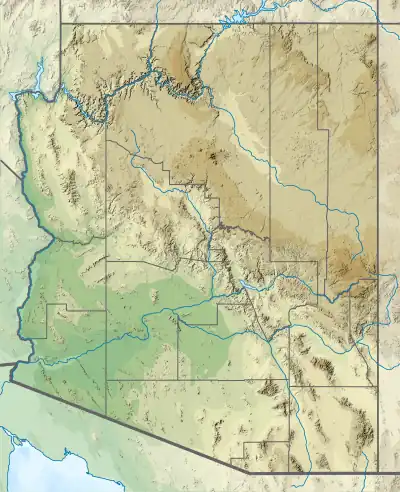 Apollo Temple Location in Arizona  Apollo Temple Apollo Temple (the United States) | |
| Location | Grand Canyon National Park Coconino County, Arizona, US |
| Parent range | Kaibab Plateau Colorado Plateau |
| Topo map | USGS Cape Royal |
| Geology | |
| Type of rock | sandstone, siltstone, limestone |
Apollo Temple is named for Apollo, god of the sun in Greek and Roman mythology.[3] This name was applied in 1902 by geologist François E. Matthes, in keeping with Clarence Dutton's tradition of naming geographical features in the Grand Canyon after mythological deities.[4] This feature's name was officially adopted in 1906 by the U.S. Board on Geographic Names.[2]
The top of Apollo Temple is composed of lower strata of the Pennsylvanian-Permian Supai Group. This overlays the cliff-forming layer of Mississippian Redwall Limestone, which in turn overlays Cambrian Tonto Group.[5] According to the Köppen climate classification system, Apollo Temple is located in a Cold semi-arid climate zone.[6] Precipitation runoff from Apollo Temple drains south to the Colorado River via Unkar and Basalt Creeks.
Gallery
References
- "Apollo Temple – 6,252' AZ". Lists of John. Retrieved January 1, 2021.
- "Apollo Temple". Geographic Names Information System. United States Geological Survey, United States Department of the Interior. Retrieved 2021-01-01.
- N.H. Darton, Story of the Grand Canyon of Arizona, 1917, page 77.
- Gregory McNamee, Grand Canyon Place Names, 1997, Mountaineers Publisher, ISBN 9780898865332, page 18.
- N.H. Darton, Story of the Grand Canyon of Arizona, 1917.
- Peel, M. C.; Finlayson, B. L.; McMahon, T. A. (2007). "Updated world map of the Köppen−Geiger climate classification". Hydrol. Earth Syst. Sci. 11. ISSN 1027-5606.
External links
- Weather forecast: National Weather Service
- 1904 postcard (Apollo Temple to left): Wikimedia
- Aerial view, Apollo Temple, Mountainzone
